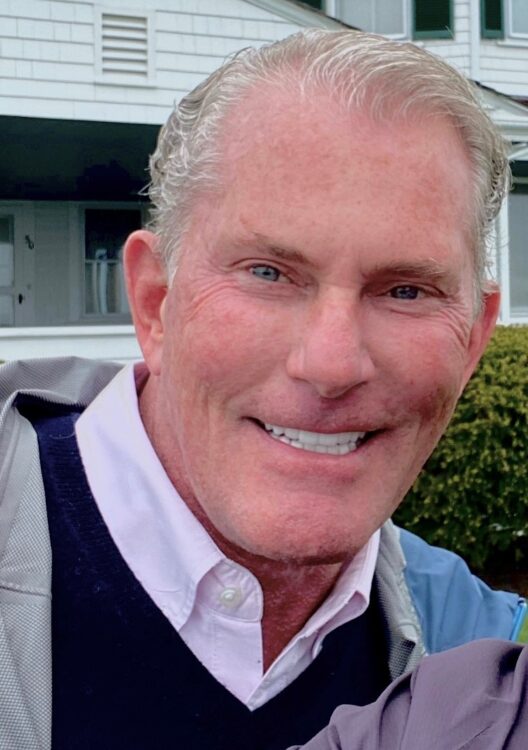 Tim is a small cell lung cancer (SCLC) survivor, but that’s just one small part of his story. Seven years ago, Tim went to his regular check-up with his primary care doctor and mentioned that he had a cough that wouldn’t go away. He had an x-ray, and a mass was found in his right lung that looked concerning. After more testing, Tim was diagnosed with SCLC. He had surgery to remove the right upper lobe of his lung and then started chemotherapy. These treatments were successful, and Tim is cancer-free to this day!
Tim is a small cell lung cancer (SCLC) survivor, but that’s just one small part of his story. Seven years ago, Tim went to his regular check-up with his primary care doctor and mentioned that he had a cough that wouldn’t go away. He had an x-ray, and a mass was found in his right lung that looked concerning. After more testing, Tim was diagnosed with SCLC. He had surgery to remove the right upper lobe of his lung and then started chemotherapy. These treatments were successful, and Tim is cancer-free to this day!
Tim began his lung cancer experience with the unique perspective of surviving two previous, very serious health conditions. In the early 1980s, Tim discovered that he was infected with the virus that causes AIDS and within a few years, in declining health, he received a full blown AIDS diagnosis. Luckily, the FDA approved the very first drug to treat HIV/AIDS at this time. Tim received the new treatment, survived and recovered. Then, many years after his HIV diagnosis, Tim was diagnosed with stage III (3) non-Hodgkin’s lymphoma. Luckily, he was treated and survived that disease, as well. Fifteen years later, at 57 years old, Tim received his SCLC diagnosis.
For Those Newly Diagnosed
When asked what he would want those newly diagnosed with lung cancer to know, Tim said, “trust your gut if things don’t feel right” and “advocate for yourself and your care.” When Tim’s SCLC was first discovered, he struggled to get information about his biopsy results which then delayed treatment plans. He was left with more questions than answers and most importantly, things just didn’t feel right to him. It was at that point Tim decided to transfer his care to a different cancer center in his area. Within two days he had a surgeon and a plan.
It’s very important to feel comfortable with your healthcare team, be able to speak easily with them and get answers to questions and concerns. If this isn’t happening, it may be time to look elsewhere.
Finding purpose
Tim’s health history is frightening. Most people experiencing even one of these diagnoses would be devastated, as Tim was the time. He grew stronger and more resilient from these experiences, but it wasn’t always easy. Due to the long-term effects of his treatments, Tim had to retire from the work he loved. This left him feeling isolated, alone and without purpose. But with reflection, exercise, meditation and the ongoing support of his family and husband of fifteen years, Scott, in time, Tim found a new perspective and renewed purpose using his life experiences to help others. Tim is currently on the Patient Advisory Council at Dana Farber Cancer Center and advocates for improvements to the patient experience. He is also an advocate for the LGBTQ community and strives to increase awareness of clinical trials in minority populations.
Tim believes that facing a huge life change like a major medical diagnosis can feel like a loss and grief can set in. He learned to move through these difficult periods step by step and piece by piece. Looking at the entire journey is overwhelming, but if you can focus on one thing at a time you’ll get through it. His mantra is, “do not give up. Keep going.”
Tim has defied the odds through each of his diagnoses. He is a good example of the fact that every person will have their own experiences and outcomes, regardless of what statistics might say.
Tim’s experience being successfully treated for HIV/AIDS is a good reminder of the hope that exists for lung cancer treatment. There weren’t any effective treatments for Tim when he was first diagnosed with HIV, but that is no longer the case. Thanks to new treatment options, most people can now live long, healthy lives after an HIV diagnosis. With limited treatments available for small cell lung cancer today, this is a reminder to remain hopeful. New treatments are being studied and advances in lung cancer care are coming more quickly now than ever before!

[…] post Survivor Spotlight: Tim S. appeared first on GO2 for Lung […]
When I received my diagnosis, I was told SCLC was inopreative. When did this change. I was diagnosed in 2014, went through 6 months of Chemo. Have yearly CT scans and still cancere free after 9 years.